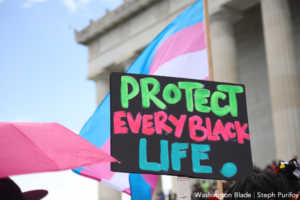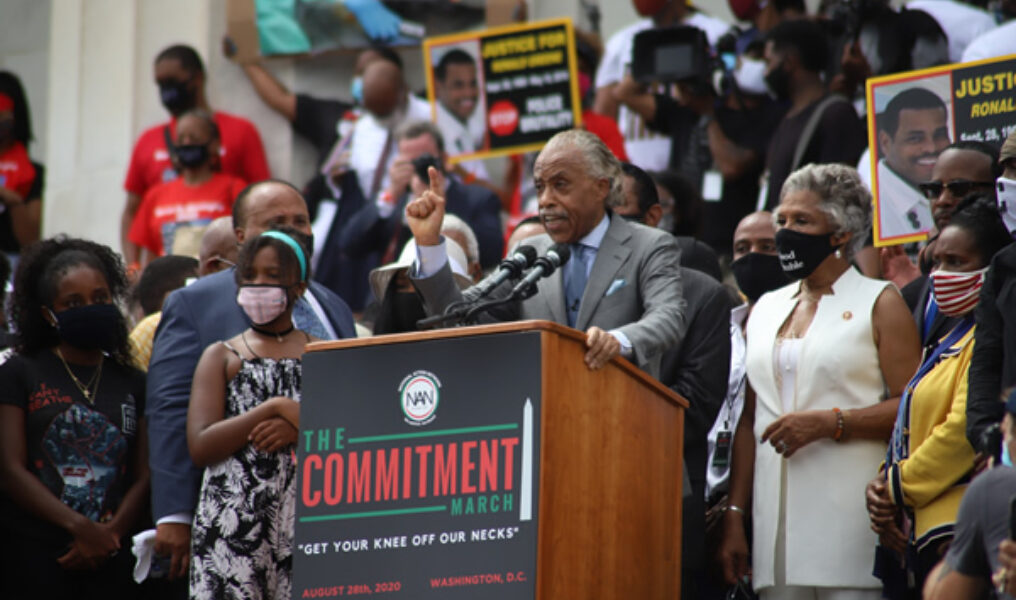LGBTQ activists joined tens of thousands of protesters at the Lincoln Memorial on Friday to demand the end of systemic racism and police brutality in one of the largest Black Lives Matter marches of the year.
The National Action Network organized the rally, which featured high-profile speakers like Rev. Al Sharpton, Martin Luther King III and family members of victims of police brutality.
Titled the Commitment March on Washington, the event also served to honor the 57th anniversary of the first March on Washington where Martin Luther King, Jr., gave his "I Have a Dream" speech on the steps of the Lincoln Memorial.
The march comes at the end of a summer marked by instances of police brutality in multiple cities across the country. The murder of George Floyd at the hands of a then-Minneapolis police officer in May rekindled the very movement which brought Martin Luther King Jr. to D.C. 57 years ago to demand racial justice and equality.
Queen Jean, a Black transgender drag performer from New York City, said she and her friends woke at the crack of dawn to make sure they could represent the LGBTQ community in the demonstration. She carried a large trans flag up to the steps of the Lincoln Memorial, waving it before the sea of protesters.
"Our purpose is to give trans voices and trans people access to love," Jean said "We as a community need to recognize their power and strength so we have to affirm our family. Trans people, trans women, Black trans people can exist in any space. We are divinely made and created so yes, we will be seen. I will make sure that my generation and the next generation do not need to feel small, they do not need to be silent, they do not have to dim their light so others can shine."
Starting at 7 a.m., thousands of protesters gathered in lines which snaked for nearly a mile around the National Mall. They were waiting to have their temperature taken before entering the rally, which was one of the many safety measures the organizers put in place. Plastic gloves were distributed along with hand sanitizer at multiple stations around the National Mall.
The National Action Network originally estimated the crowd would swell to 100,000 but this number was lowered to 50,000 after concerns were raised about protesters coming to D.C. from other states.
Dmitri Stoyanoff, 39, said he came out to the protest with several others from Portland, Ore., to join the demonstrations. He strode through the marchers with Pride flags waving from his backpack. Stoyanoff said he contributed to the day's events by working to register marchers to vote.
He wanted to support the BLM protesters because they inspired him to come out as queer in June, he said.
"After marching for a couple weeks and listening to all these young, beautiful, Black voices talking about how this was the first time in their whole lives that they felt proud of being black, I realized that I needed to love myself too," Stoyanoff said. "Black Lives Matter is for every American. Every gender, sexual orientation, race they're fighting for all of us if people would care to listen."
The protest concluded with a march scheduled to head to the MLK memorial but soon after exiting the Mall, protesters splintered to several different spots in the city. Some went to the memorial while others split to Black Lives Matter Plaza.
For Human Rights Campaign President Alphonso David, the Black Lives Matter and LGBTQ civil rights movements are the same movement. As a Black gay man, David said he is oppressed for both parts of his identity.
"The Black Lives Matter movement, the LGBTQ rights movement, the Latinx movement, we're all fighting for liberation. We're all fighting so that we can live in this country and achieve liberation and equality," he told the Washington Blade. "I cannot be free as a gay man if I am not free as a Black man. The LGBTQ civil rights movement is a part of the BLM movement. As Black people, as POC, we shouldn't be forced to choose between our sexual orientation, our gender identity, and our race."

(Washington Blade photo by Steph Purifoy)
This article originally appeared in the Washington Blade and is made available in partnership with the National LGBT Media Association.










